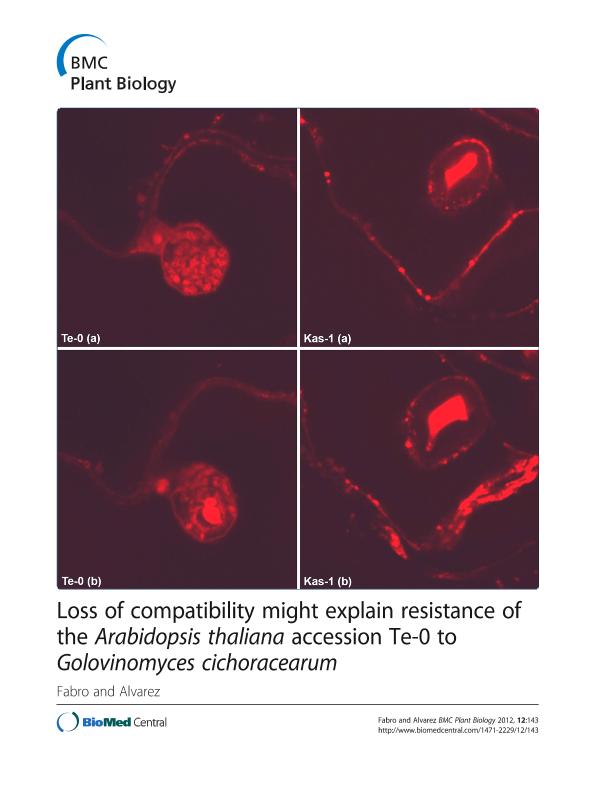Mostrar el registro sencillo del ítem
dc.contributor.author
Fabro, Georgina

dc.contributor.author
Alvarez, Maria Elena

dc.date.available
2023-05-31T17:59:59Z
dc.date.issued
2012-08
dc.identifier.citation
Fabro, Georgina; Alvarez, Maria Elena; Loss of compatibility might explain resistance of the Arabidopsis thaliana accession Te-0 to Golovinomyces cichoracearum; BioMed Central; BMC Plant Biology; 12; 143; 8-2012; 1-14
dc.identifier.uri
http://hdl.handle.net/11336/199182
dc.description.abstract
The establishment of compatibility between plants and pathogens requires compliance with various conditions, such as recognition of the right host, suppression of defence mechanisms, and maintenance of an environment allowing pathogen reproduction. To date, most of the plant factors required to sustain compatibility remain unknown, with the few best characterized being those interfering with defence responses. A suitable system to study host compatibility factors is the interaction between Arabidopsis thaliana and the powdery mildew (PM) Golovinomyces cichoracearum. As an obligate biotrophic pathogen, this fungus must establish compatibility in order to perpetuate. In turn, A. thaliana displays natural variation for susceptibility to this invader, with some accessions showing full susceptibility (Col-0), and others monogenic dominant resistance (Kas-1). Interestingly, Te-0, among other accessions, displays recessive partial resistance to this PM.Results: In this study, we characterized the interaction of G. cichoracearum with Te-0 plants to investigate the basis of this plant resistance. We found that Te-0́s incompatibility was not associated with hyper-activation of host inducible defences. Te-0 plants allowed germination of conidia and development of functional haustoria, but could not support the formation of mature conidiophores. Using a suppressive subtractive hybridization technique, we identified plant genes showing differential expression between resistant Te-0 and susceptible Col-0 plants at the fungal pre-conidiation stage.Conclusions: Te-0 resistance is likely caused by loss of host compatibility and not by stimulation of inducible defences. Conidiophores formation is the main constraint for completion of fungal life cycle in Te-0 plants. The system here described allowed the identification of genes proposed as markers for susceptibility to this PM.
dc.format
application/pdf
dc.language.iso
eng
dc.publisher
BioMed Central

dc.rights
info:eu-repo/semantics/openAccess
dc.rights.uri
https://creativecommons.org/licenses/by-nc-sa/2.5/ar/
dc.subject
A. THALIANA
dc.subject
COMPATIBILITY FACTORS
dc.subject
CONIDIOPHORE MATURATION
dc.subject
G. CICHORACEARUM
dc.subject
HAUSTORIAL IMAGING
dc.subject
HAUSTORIAL STAINING
dc.subject
LOSS OF SUSCEPTIBILITY
dc.subject
POWDERY MILDEWS
dc.subject.classification
Bioquímica y Biología Molecular

dc.subject.classification
Ciencias Biológicas

dc.subject.classification
CIENCIAS NATURALES Y EXACTAS

dc.title
Loss of compatibility might explain resistance of the Arabidopsis thaliana accession Te-0 to Golovinomyces cichoracearum
dc.type
info:eu-repo/semantics/article
dc.type
info:ar-repo/semantics/artículo
dc.type
info:eu-repo/semantics/publishedVersion
dc.date.updated
2023-05-30T11:59:21Z
dc.identifier.eissn
1471-2229
dc.journal.volume
12
dc.journal.number
143
dc.journal.pagination
1-14
dc.journal.pais
Reino Unido

dc.journal.ciudad
Londres
dc.description.fil
Fil: Fabro, Georgina. Consejo Nacional de Investigaciones Científicas y Técnicas. Centro Científico Tecnológico Conicet - Córdoba. Centro de Investigaciones en Química Biológica de Córdoba. Universidad Nacional de Córdoba. Facultad de Ciencias Químicas. Centro de Investigaciones en Química Biológica de Córdoba; Argentina
dc.description.fil
Fil: Alvarez, Maria Elena. Consejo Nacional de Investigaciones Científicas y Técnicas. Centro Científico Tecnológico Conicet - Córdoba. Centro de Investigaciones en Química Biológica de Córdoba. Universidad Nacional de Córdoba. Facultad de Ciencias Químicas. Centro de Investigaciones en Química Biológica de Córdoba; Argentina
dc.journal.title
BMC Plant Biology

dc.relation.alternativeid
info:eu-repo/semantics/altIdentifier/url/http://www.biomedcentral.com/1471-2229/12/143
dc.relation.alternativeid
info:eu-repo/semantics/altIdentifier/doi/http://dx.doi.org/10.1186/1471-2229-12-143
Archivos asociados
